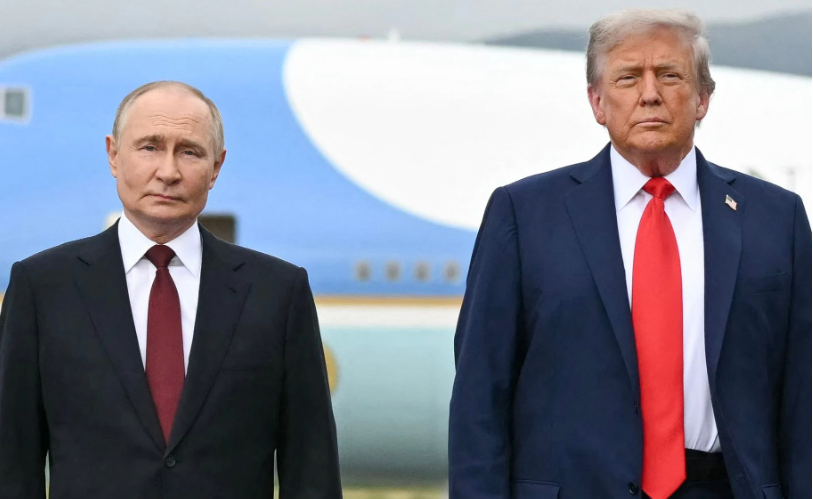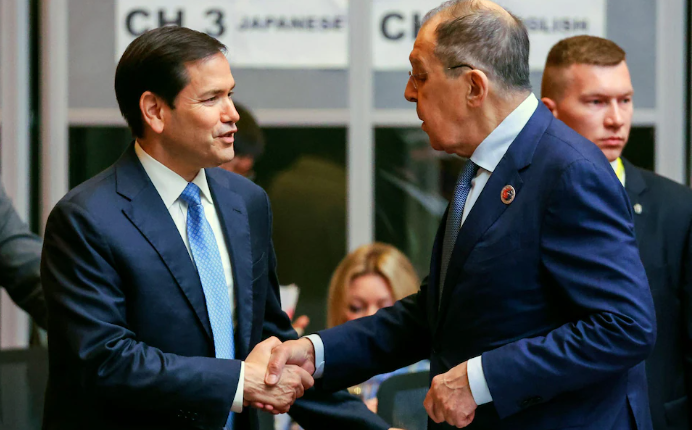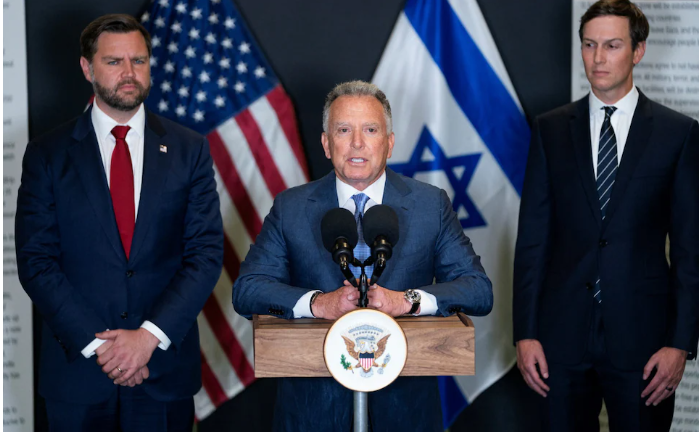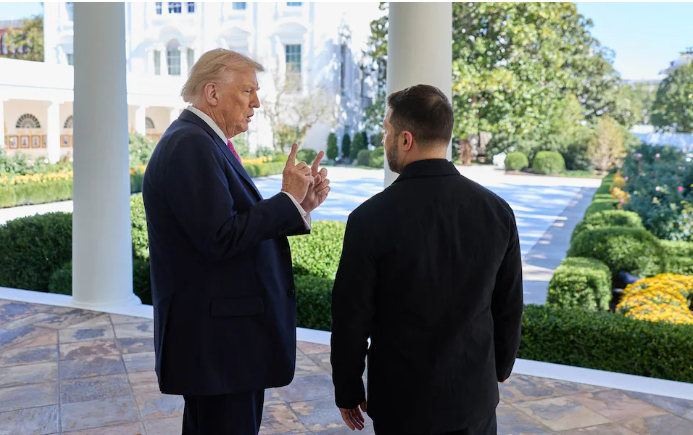The Telegraph. Hungary summit shelved after Russia refuses to freeze front lines and phone call between foreign ministers turns sour
Peace talks between Donald Trump and Vladimir Putin have been called off after Russia refused to accept America’s terms for a ceasefire in Ukraine.
The White House said on Tuesday that the US president would not meet his Russian counterpart “in the immediate future” after a phone call between negotiators to prepare for their summit in Hungary turned sour.
Sergei Lavrov, the Russian foreign minister, told Marco Rubio, the US secretary of state, that Russia would not agree to a ceasefire that froze the front lines in Ukraine.
“An immediate ceasefire in Ukraine would mean only one thing: most of it would remain under Nazi rule,” Mr Lavrov said, suggesting that Russia was still determined for regime change in Ukraine.
Read also
Volodymyr Zelensky, Ukraine’s president, and his European allies leapt on the Kremlin’s refusal to negotiate, accusing Putin of “stalling tactics”.
Seeking to take advantage of Russia’s stubbornness, Europe swiftly dispatched Mark Rutte, Nato’s secretary-general, to brief Mr Trump on a separate 12-point peace plan being worked up by “the coalition of the willing”, the European grouping of countries formed to back Ukraine.
The preparations for a Trump-Putin meeting descended into acrimony when Moscow cancelled a planned face-to-face meeting between Mr Lavrov and Mr Rubio in Hungary.
Instead, the pair had a phone call on Monday, in which the Russian told his opposite number he would not agree to a ceasefire on America’s terms.
Signalling a breakdown in the talks between Washington and Moscow, a White House official said on Tuesday that the call between Mr Rubio and Mr Lavrov had been “productive”, adding: “Therefore, an additional in-person meeting between the secretary and foreign minister is not necessary, and there are no plans for President Trump to meet with President Putin in the immediate future.”
The Kremlin then pointed out that no clear date had been set for the meeting, even though the US president said last Friday that it would likely happen “within two weeks”.
“Listen, we have an understanding of the presidents, but we cannot postpone what has not been finalised,” Dmitry Peskov, the Kremlin spokesman, said. “Neither President Trump nor President Putin gave exact dates.”
Asked why the summit was cancelled, Mr Trump said he didn’t want to “have a wasted meeting”.
“I don’t want to have a waste of time, so I’ll see what happens,” he told reporters in the Oval Office.
Mr Trump added that he still “sees a chance” for a Russia-Ukraine ceasefire.
Mr Trump announced last week that he had ordered officials to prepare a second peace summit with Putin, months after their meeting in Alaska failed to break the deadlock.
But Mr Lavrov told Mr Rubio that Moscow’s maximalist war aims, which include ousting Mr Zelensky, had not changed since the two presidents’ last meeting in August.
“I want to officially confirm: Russia has not changed its position compared to the understandings that were reached during the Alaska summit,” Mr Lavrov said.
Russia has long demanded that Ukraine withdraws from the entirety of the eastern Donetsk and Luhansk regions as the precondition of peace.
During a two-hour phone call on Thursday, Putin told Mr Trump that he would relinquish claims over unoccupied parts of the Ukrainian regions of Zaporizhzhia and Kherson in exchange for a complete Ukrainian surrender of the two Donbas regions.
Steve Witkoff, the US president’s peace envoy, who has regularly met with Putin, told Mr Zelensky that Russia had a constitutional claim to these lands.
The Ukrainian president has repeatedly rejected this and insisted he would not cede land not occupied by Russian forces that Putin had claimed via sham referendums.
During their bruising White House meeting on Friday, Mr Trump reportedly pressured Mr Zelensky to surrender the Donetsk region to Russia.
Ceding Donetsk, which Moscow has failed to fully occupy since 2014, remains a red line for the Ukrainian president.
However, speaking after the talks, Mr Trump appeared to row back behind the Ukrainian position, insisting he wanted to see the fighting “stop at the lines where they are, the battle lines”.
Russia avoiding diplomacy
On Tuesday, Mr Zelensky wrote on social media: “The front line can be the beginning of diplomacy. Meanwhile, Russia is once again doing everything to avoid diplomacy.”
Mr Zelensky’s plea at his White House meeting for long-range Tomahawk missiles also went unanswered by Mr Trump.
Friedrich Merz, the German chancellor, said the visit “had not gone as Zelensky hoped”.
But on Tuesday, Europeans were buoyed by Russia’s refusal to negotiate, sensing an opportunity to sway Mr Trump’s support back in favour of Kyiv.
A Western official told The Telegraph: “I see it as a positive development. Russia has been clear their position has not changed so why the meeting?”
In a statement published on Tuesday, Mr Zelensky and his supporters in the coalition of the willing argued any future peace talks with Putin must be held on the basis that “the current line of contact should be the starting point”.
“We remain committed to the principle that international borders must not be changed by force,” they added.
Meanwhile, they finalised a 12-point peace plan to be presented to Mr Trump on Wednesday, which included points such as the return of stolen Ukrainian children, a rapid pathway to European Union membership and reconstruction reparations.
The pact will demand that the starting point of any future peace talks between Moscow and Kyiv be on the basis of the current front lines.
European officials have gone to great lengths to highlight Russia’s struggles to capture less than 1 per cent of Ukrainian territory in over 1,000 days of war.
Sources said Europe’s proposal was modelled on Mr Trump’s peace deal for Gaza, which gave him renewed impetus to end the fighting in Ukraine.
Jonathan Powell, Britain’s national security adviser, has been credited with the idea of playing on the American’s ego.
The plan will be discussed at a meeting of the coalition of the willing hosted in London by Sir Keir Starmer on Friday, which Mr Zelensky will attend in person.
The European Union is expected to sign off on a separate plan to deliver a €140bn loan to Kyiv using frozen Russian assets at a meeting of the bloc’s leaders in Brussels on Thursday.
It emerged on Tuesday night that Ukrainian forces had used British-made Storm Shadow missiles to strike the Bryansk Chemical plant in Russia.
The plant is deemed critical for Putin’s war machine, producing gunpowder, explosives and rocket fuel.
























































